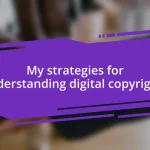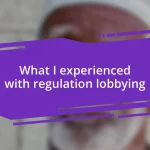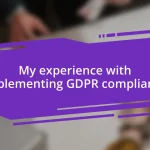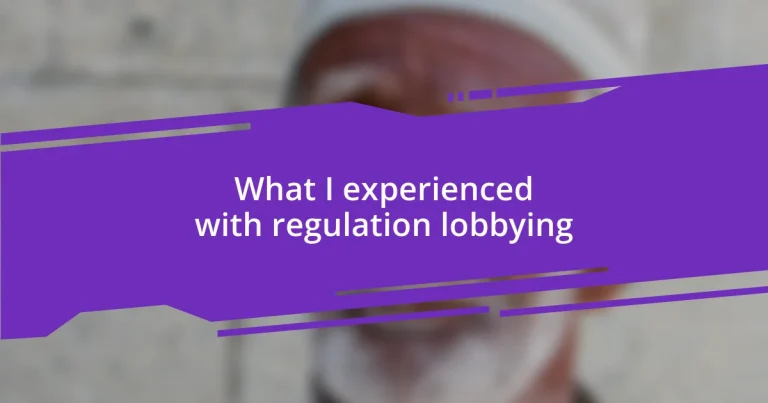Key takeaways:
- Effective regulation lobbying relies on building relationships, employing storytelling, and engaging communities to resonate emotionally with decision-makers.
- Key stakeholders in regulation include policymakers, industry representatives, and public interest groups, all of whom play vital roles in shaping regulatory outcomes.
- Success in lobbying is measured through clear goals, analyzing communication effectiveness, and nurturing relationships, with an emphasis on active listening and celebrating small wins.
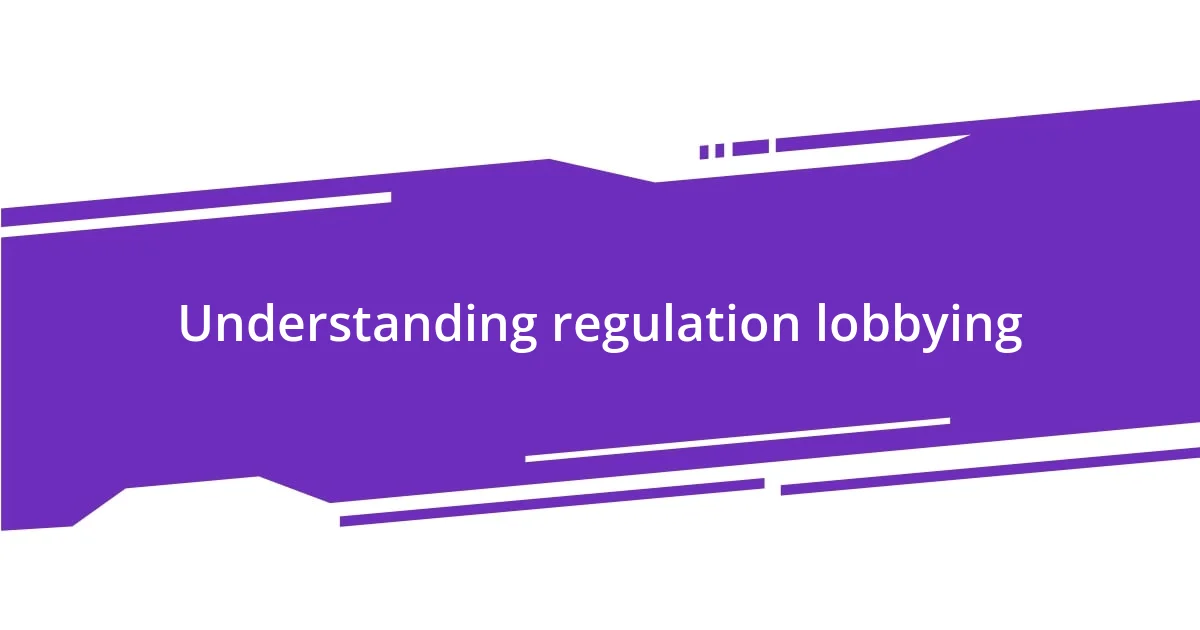
Understanding regulation lobbying
Regulation lobbying is a nuanced activity where individuals or organizations advocate for specific regulatory outcomes that align with their interests. I recall my first encounter with lobbyists at a public hearing—it was eye-opening to see the passionate exchanges and the depth of knowledge they brought to the table. I often wondered, how do these voices shape the policies that govern industries?
From my experience, regulation lobbying isn’t just about influencing lawmakers; it’s about building relationships and trust. There were times when I sat in on meetings where lobbyists presented compelling evidence, sharing stories that influenced decision-makers. Did you know that effective lobbyists often weave emotional narratives into their arguments? This strategy resonates well with those who can’t relate to complex statistics but feel the impact on their communities.
Understanding the regulatory landscape is essential for successful lobbying. I’ve seen firsthand how a well-crafted strategy, combined with clear, relatable messaging, can turn the tide in favor of an initiative. It’s not just a game of power; it’s about effectively conveying concerns that matter. So, when has a particular regulation impacted your life directly? Reflecting on these experiences can truly illuminate the importance of regulation lobbying.
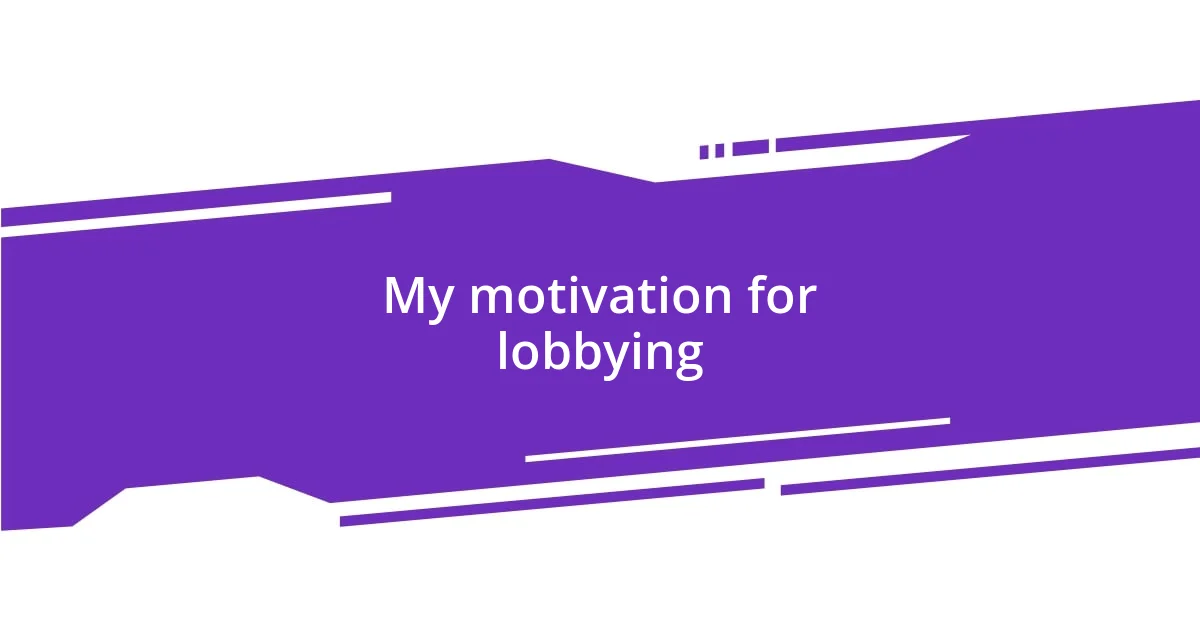
My motivation for lobbying
My motivation for lobbying stems from a deep-seated desire to advocate for the values and issues I truly believe in. I remember standing in front of a committee, feeling the weight of the moment, as I passionately argued for a regulatory change that could positively impact my community. It was an emotional experience, realizing that my voice had the potential to effect real change in people’s lives.
- Seeing the struggles my neighbors faced daily opened my eyes to the power of advocacy.
- Witnessing the difference a single regulation can make drives me to engage in this arena.
- Knowing that I can contribute to shaping policies that matter fuels my determination to lobby effectively.
Each encounter, every story shared, reinforces my belief that we all have a role in influencing regulations that govern our lives. When I hear the heartfelt testimonies of those affected by policy decisions, it reminds me why I chose this path. It isn’t just about informing lawmakers; it’s about creating a better future for all of us.
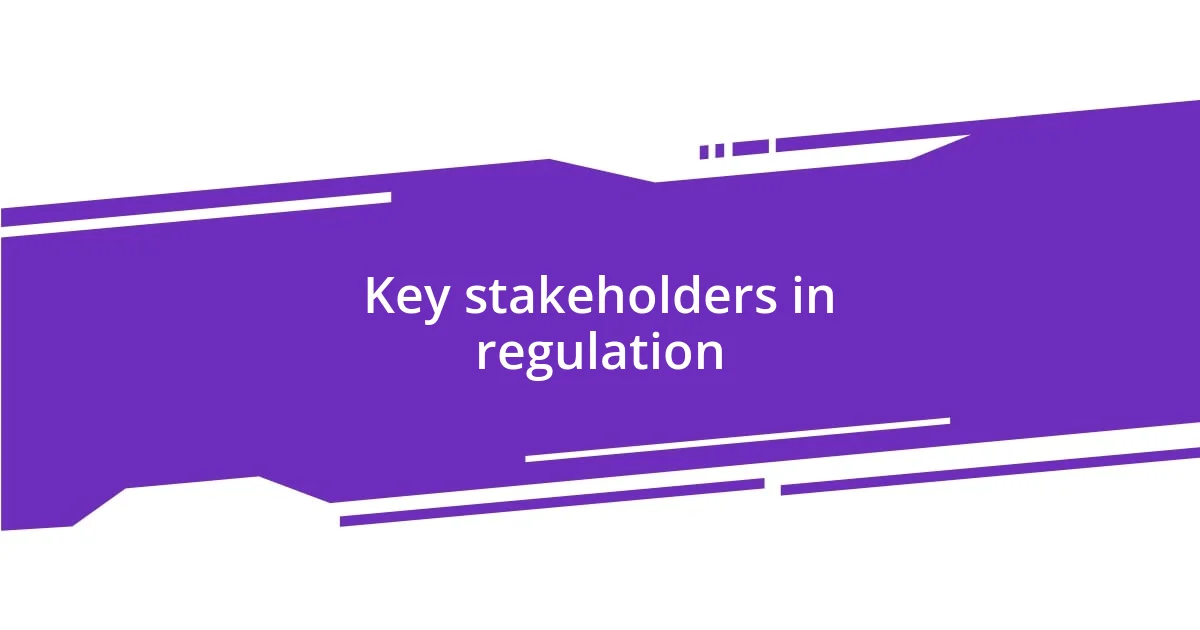
Key stakeholders in regulation
Key stakeholders in regulation play a crucial role in shaping the landscape of lobbying. In my experience, policymakers are at the top of this hierarchy, as they ultimately draft and implement the regulations. I distinctly remember a session where a state official genuinely listened to community concerns and how that dialogue shifted the focus of new laws.
Another important group includes industry representatives, who often push for regulations that benefit their sectors. I’ve watched as business leaders skillfully presented case studies to back their positions, which sometimes made me realize the delicate balance between economic interests and public welfare. Their arguments can sway regulators if they resonate with the concerns on the ground.
Lastly, public interest groups serve as a vital counterbalance to industry voices. I’ve seen advocacy organizations mobilize everyday citizens to voice their needs, reminding those in power that people matter most. The passion and urgency during a rally I attended once really brought home how engaged communities can pressure regulators into considering broader societal implications.
| Stakeholder Type | Role in Regulation |
|---|---|
| Policymakers | Draft and implement regulations, interact directly with communities. |
| Industry Representatives | Promote regulations beneficial to their sectors, often using data and case studies. |
| Public Interest Groups | Mobilize community voices and advocate for broader societal impacts. |
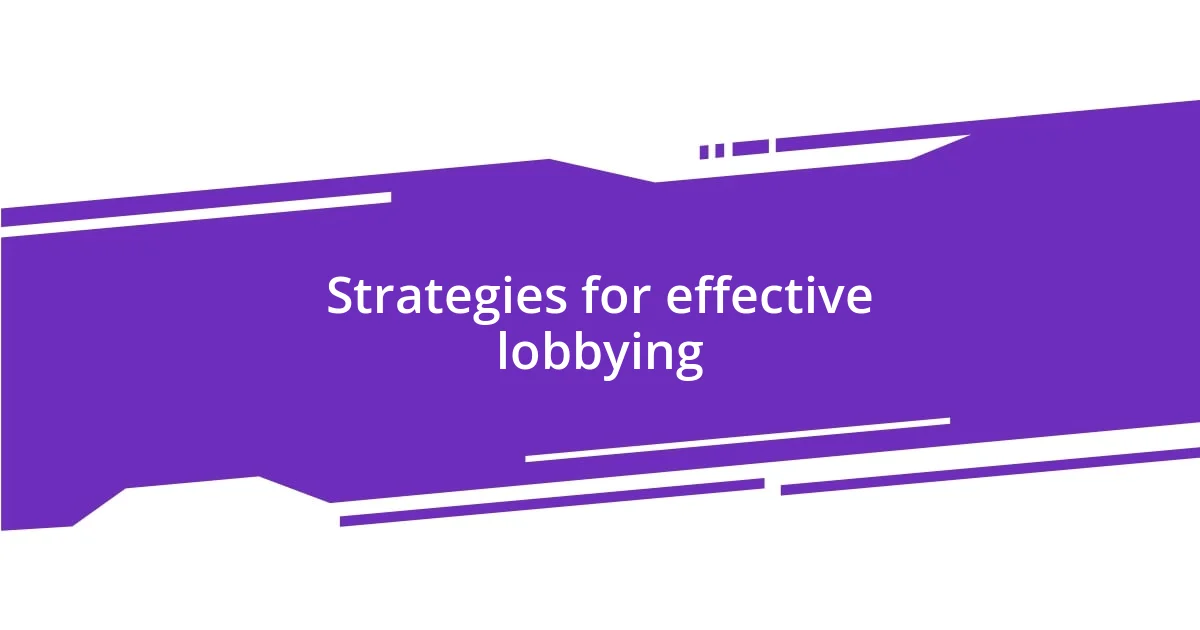
Strategies for effective lobbying
Effective lobbying isn’t just about shouting louder; it’s about being strategic. One of the most impactful strategies I’ve discovered is the power of storytelling. When I shared a poignant story about a friend’s struggle with a regulatory gap, the response was palpable. It’s fascinating how real-life narratives can evoke emotions that statistics alone rarely achieve. Don’t you think a personal connection can resonate more deeply with decision-makers?
Building solid relationships with key stakeholders is another essential strategy. I recall attending a networking event where I could directly engage with policymakers over coffee. Those casual conversations often led to deeper discussions about the issues that matter most. This kind of rapport makes it easier to share your concerns when it counts because you’re no longer just another voice; you’re a trusted collaborator.
Another approach is to engage proactively with your community. Organizing community forums to discuss various regulatory issues not only raises awareness but also strengthens your advocacy efforts. I once hosted a meeting where residents shared their perspectives, and we collectively drafted a letter to our representatives. It was empowering to see everyone come together, and it reminded me that effective lobbying is as much about uniting voices as it is about individual advocacy.
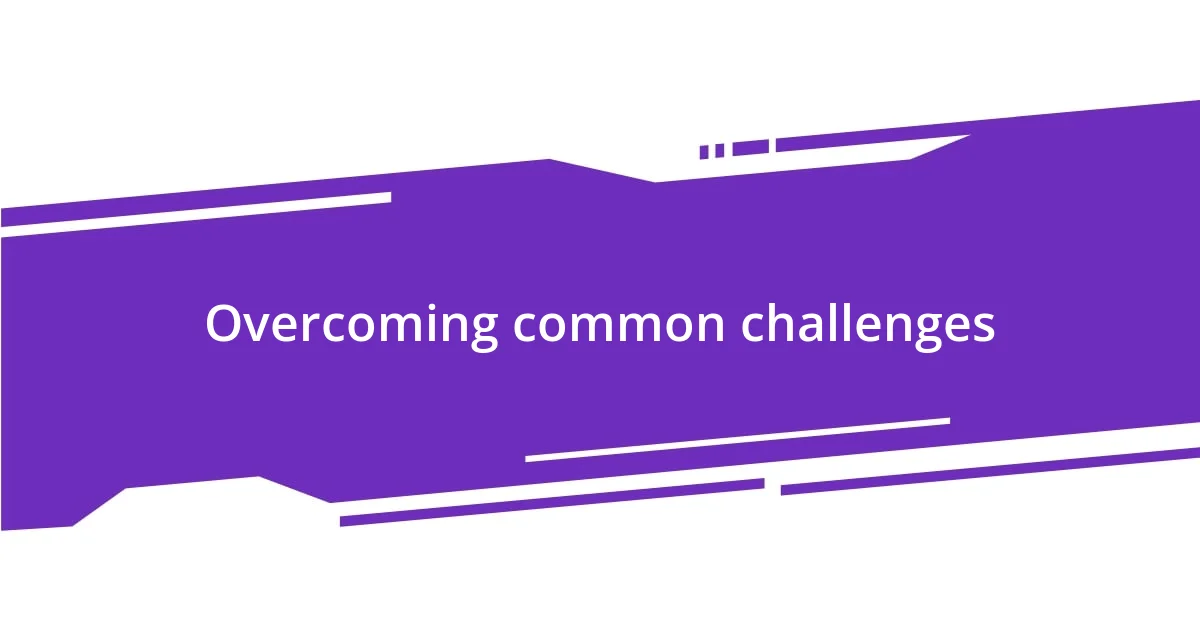
Overcoming common challenges
Navigating the challenges of regulation lobbying can be daunting, but I’ve learned that persistence is key. One memorable moment for me was when I faced pushback from a policymaker who doubted the need for change. Instead of backing down, I engaged in a friendly but firm discussion, sharing the experiences of those affected. That exchange was eye-opening; it reminded me that sometimes, the real obstacle is the lack of understanding, and a well-articulated point can break down those barriers.
Another common challenge is mobilizing support. I’ve encountered times when community members were hesitant to participate, feeling their voices wouldn’t matter. I vividly recall organizing a small grassroots event. To my surprise, we attracted a passionate crowd that didn’t just fill the room; they filled it with ideas and questions. It proved to me that creating a safe space for dialogue can significantly empower individuals, leading to stronger collective action. Have you ever seen a group come together and realize their collective strength? It’s a transformative experience!
Budget constraints can also hinder lobbying efforts. I’ve faced moments where financing an initiative seemed impossible. However, I discovered that fostering partnerships with local organizations could alleviate some of those pressures. One time, I teamed up with a nonprofit that shared our goals, and together, we secured funding for a crucial campaign. Reflecting on that experience, I realized that collaboration often opens new avenues and provides support when resources are tight. It’s a great reminder that we can accomplish more together.
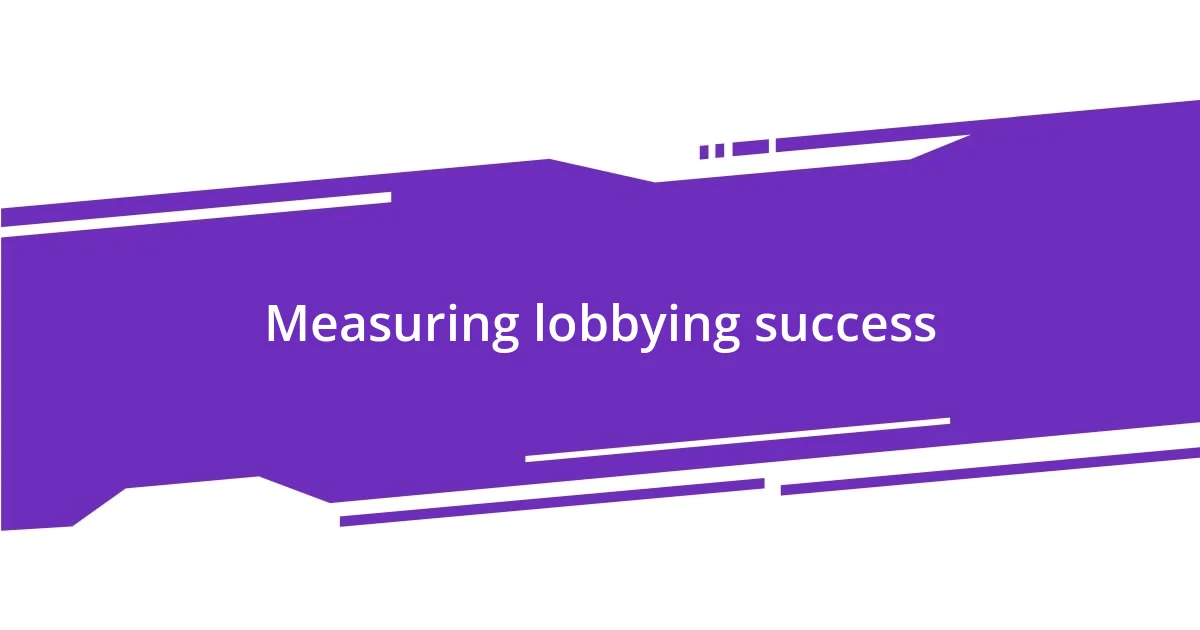
Measuring lobbying success
Measuring the success of lobbying efforts can sometimes feel like a nebulous task, but I’ve found that setting clear, quantifiable goals is essential. For instance, the first time I aimed to influence a specific piece of legislation, I tracked our progress through metrics like increased public support or amendments made to the bill. Seeing the numbers rise was exhilarating and grounded my efforts. Have you ever felt that rush when your efforts begin to truly resonate with the public?
Another key aspect is analyzing how effectively we’ve communicated our message. I remember a pivotal moment when I launched a social media campaign to raise awareness about a regulatory issue. We monitored engagement levels and feedback from our audience closely, and it was rewarding to see conversations sparked as people shared their stories. Reflecting on that experience, I realized that when we engage the grassroots, the impact can snowball far beyond our initial expectations.
Finally, it’s vital to assess the relationships you’ve built along the way. In one of my lobbying initiatives, I took the time to follow up with policymakers after a significant meeting. Their willingness to continue the conversation indicated a success that went beyond legislation. That lingering rapport felt like a victory in itself. Have you noticed how even small interactions can cultivate long-lasting partnerships?
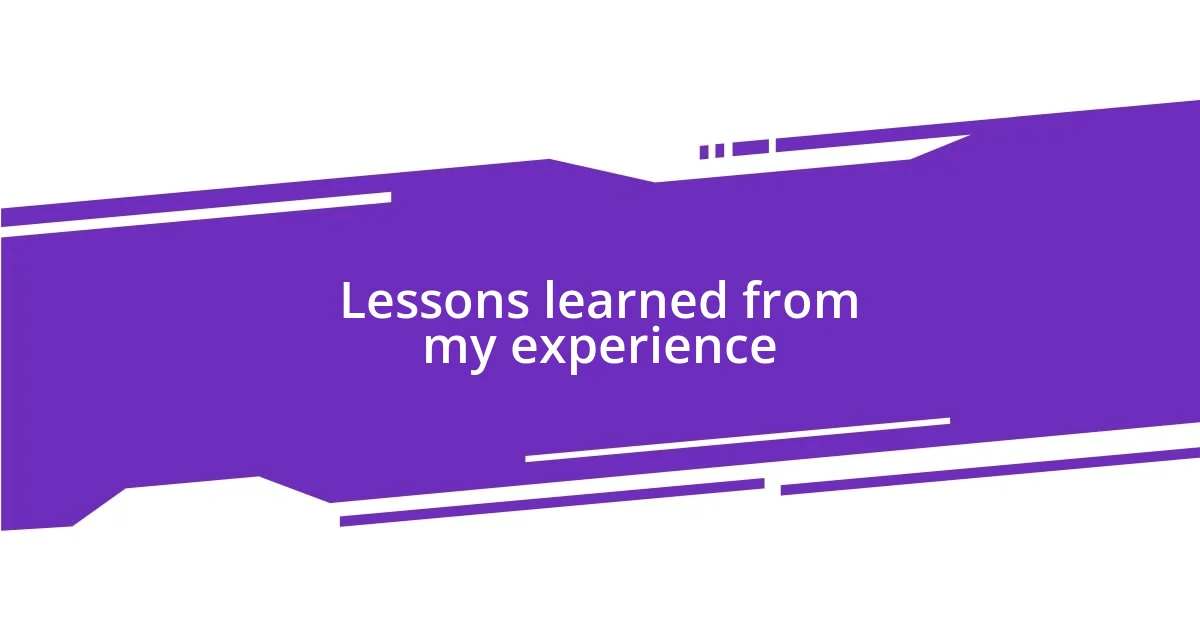
Lessons learned from my experience
One of the most valuable lessons I learned is the importance of active listening. I recall a meeting where a key stakeholder expressed concerns that weren’t initially on my radar. Instead of dismissing their worries, I focused intently on their points of view. This approach not only helped me understand their perspective better but also created a space for genuine dialogue. Have you ever experienced how listening can transform a conversation? It’s an incredible tool.
In addition to listening, adaptability has been a game-changer for me. There was a moment during a campaign when we had to pivot our strategy due to unforeseen opposition. Initially, it felt like a setback, but embracing that shift allowed us to tap into new avenues of advocacy. I learned that being flexible can often lead to unexpected opportunities. Think about how often you’ve had to course-correct in your own journey; it’s a skill worth cultivating!
Lastly, I found that celebrating small wins is essential for maintaining motivation. Every incremental success—no matter how minor—has a ripple effect. There was a particular occasion where we gathered enough signatures for a petition that was a drop in the bucket compared to our larger goal. Instead of overlooking it, we made a point to celebrate that milestone. Reflecting on this, I realized that recognizing progress keeps the momentum alive and can invigorate collective efforts. Don’t you think those small victories can be just as meaningful?



